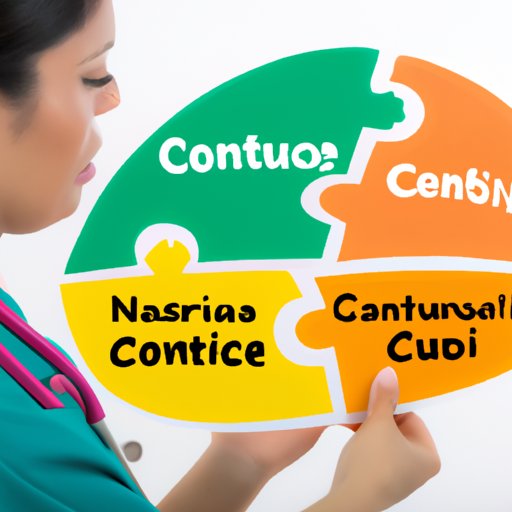Introduction
Cultural competence in nursing is an important concept that has recently gained attention due to the increasing diversity of healthcare settings. Cultural competence refers to the ability of nurses to understand and respect cultural differences among their patients, and to provide culturally sensitive, appropriate, and effective care. In order to provide quality care, nurses must be able to recognize and respond to the unique needs of each patient. This requires a deep understanding of the patient’s background, beliefs, and values, as well as an appreciation of their culture.

Exploring the Benefits of Cultural Competence in Nursing
Cultural competence in nursing can lead to several positive outcomes for both patients and healthcare providers. The following are some of the key benefits of cultural competence in nursing:
Improved Patient Care
Culturally competent care leads to improved patient care. When nurses demonstrate an understanding of and respect for a patient’s cultural values and beliefs, they are better able to provide individualized care that meets the patient’s needs. This can lead to better health outcomes and greater patient satisfaction.
Enhanced Nurse-Patient Relationships
Cultural competence also helps to create strong nurse-patient relationships. When nurses take the time to understand a patient’s culture, they are better able to connect with them on a personal level. This allows nurses to build trust and respect with their patients, which can lead to more effective communication and a stronger therapeutic relationship.
Increased Quality of Care
Finally, cultural competence can lead to increased quality of care. By taking the time to understand and respect cultural differences, nurses can provide more effective, individualized care that meets the unique needs of each patient. This can lead to better health outcomes, improved patient compliance, and higher levels of patient satisfaction.

Understanding Cultural Differences to Improve Patient Care
In order to provide culturally competent care, nurses must first understand the various cultural differences that exist between patients. This includes identifying any potential barriers to effective communication such as language or cultural misunderstandings. It also involves understanding the cultural values and beliefs of the patient, and respecting those values and beliefs. Here are some strategies for understanding and respecting cultural differences in order to improve patient care:
Identifying Barriers to Effective Communication
Nurses should be aware of the potential barriers to effective communication that can arise from cultural differences. This includes language barriers, cultural misunderstandings, and religious or spiritual differences. By identifying these potential barriers, nurses can take steps to ensure that communication is clear and effective.
Understanding Cultural Values and Beliefs
Nurses should also strive to understand the cultural values and beliefs of their patients. This means taking the time to learn about the patient’s culture, and being willing to ask questions if there is something that is not understood. This will allow nurses to better understand the patient’s needs and provide more individualized care.
Respecting Cultural Differences
Finally, nurses should strive to respect the cultural differences of their patients. This means being open to different ways of thinking and behaving, and avoiding making assumptions based on one’s own cultural norms. By respecting cultural differences, nurses can create an environment of acceptance and understanding, which can lead to improved patient care.

The Role of Cultural Competency in Nursing Education
In order to provide culturally competent care, nurses need to have a strong understanding of cultural differences. This understanding can be gained through cultural competency training programs and courses, which are becoming increasingly common in nursing education. These courses are designed to help nurses develop cultural awareness, sensitivity, and knowledge. Here are some of the ways that cultural competency can be incorporated into nursing education:
Incorporating Cultural Competence into Nursing Curriculum
Cultural competency can be incorporated into nursing curriculum by providing courses and seminars that focus on cultural awareness and sensitivity. These courses can include topics such as cultural values and beliefs, language barriers, and religious and spiritual differences. This can help nurses gain a deeper understanding of cultural differences and how they can affect patient care.
Developing Cultural Awareness and Sensitivity
Nursing students should also be encouraged to develop cultural awareness and sensitivity. This can be done through activities such as role-playing, case studies, and simulations. These activities can help students gain an understanding of cultural differences and how to interact with patients from different backgrounds.
Enhancing Cultural Knowledge
Finally, nursing students should strive to enhance their cultural knowledge. This can be done by reading books, articles, and other materials related to different cultures. It can also involve attending cultural events or speaking to people from different backgrounds. By increasing their cultural knowledge, nurses can better understand and respect the cultural differences of their patients.
How Cultural Competence Can Affect Quality of Care
Cultural competence can have a significant impact on the quality of care provided to patients. Here are some of the ways that cultural competence can affect quality of care:
Improving Patient Safety
Cultural competence can lead to improved patient safety. When nurses understand and respect cultural differences, they are better able to provide individualized care that meets the specific needs of each patient. This can lead to fewer medical errors and better health outcomes.
Increasing Patient Satisfaction
Cultural competence can also lead to increased patient satisfaction. When nurses take the time to understand a patient’s cultural values and beliefs, they are better able to provide individualized care that meets their needs. This can lead to higher levels of patient satisfaction and improved health outcomes.
Reducing Medical Errors
Finally, cultural competence can reduce the rate of medical errors. By understanding cultural differences, nurses can avoid making assumptions or mistakes that could lead to medical errors. This can lead to improved patient safety and better health outcomes.
Examining the Impact of Cultural Competency on Nurse-Patient Relationships
Cultural competence can also have a positive impact on nurse-patient relationships. Here are some of the ways that cultural competence can affect nurse-patient relationships:
Building Trust and Respect
Cultural competence can help to build trust and respect between nurses and their patients. When nurses demonstrate an understanding of and respect for a patient’s culture, they are better able to connect with them on a personal level. This can lead to a stronger therapeutic relationship and improved patient care.
Understanding Patients’ Needs
Cultural competence can also help nurses to better understand the needs of their patients. By taking the time to understand a patient’s cultural values and beliefs, nurses can provide more individualized care that meets their needs. This can lead to improved patient compliance and better health outcomes.
Enhancing Patient Compliance
Finally, cultural competence can enhance patient compliance. When nurses understand and respect cultural differences, they are better able to communicate effectively with their patients. This can lead to improved patient compliance, which can lead to better health outcomes.
Identifying Barriers to Cultural Competence in Nursing
Although cultural competence is an important skill for nurses to possess, there are several barriers that can prevent nurses from providing culturally competent care. Here are some of the most common barriers to cultural competence in nursing:
Lack of Cultural Knowledge
One of the most common barriers to cultural competence is a lack of cultural knowledge. Nurses may not have sufficient knowledge of the cultural values and beliefs of their patients, which can lead to misunderstandings and ineffective communication.
Unfamiliarity with Different Cultures
Another barrier to cultural competence is unfamiliarity with different cultures. Nurses may not have had the opportunity to learn about different cultures, or may not feel comfortable interacting with patients from different cultural backgrounds.
Language Barriers
Finally, language barriers can also prevent nurses from providing culturally competent care. Language barriers can lead to misunderstandings and ineffective communication, which can prevent nurses from providing individualized care that meets the needs of their patients.
Strategies for Implementing Cultural Competency in Nursing Practice
In order to provide culturally competent care, nurses must be willing to make a commitment to learning and understanding cultural differences. Here are some strategies for implementing cultural competency in nursing practice:
Developing Cultural Awareness
Nurses should strive to develop cultural awareness by reading books, articles, and other materials related to different cultures. They should also attend cultural events, participate in educational programs, or speak to people from different backgrounds. This can help nurses to gain a deeper understanding of cultural differences.
Participating in Educational Programs
Nurses should also consider participating in educational programs that focus on cultural competency. These programs can help nurses to develop cultural awareness and sensitivity, as well as gain a better understanding of cultural values and beliefs.
Creating a Culturally Inclusive Environment
Finally, nurses should strive to create a culturally inclusive environment. This means creating an atmosphere of acceptance and understanding, and avoiding making assumptions based on one’s own culture. By creating a culturally inclusive environment, nurses can better understand and respect the cultural differences of their patients.
Conclusion
Cultural competence is an important skill for nurses to possess in order to provide quality care. By understanding and respecting cultural differences, nurses can provide individualized care that meets the unique needs of each patient. Cultural competence can also lead to improved patient safety, increased patient satisfaction, and strengthened nurse-patient relationships. Nurses can implement cultural competency in their practice by developing cultural awareness, participating in educational programs, and creating a culturally inclusive environment.
(Note: Is this article not meeting your expectations? Do you have knowledge or insights to share? Unlock new opportunities and expand your reach by joining our authors team. Click Registration to join us and share your expertise with our readers.)
